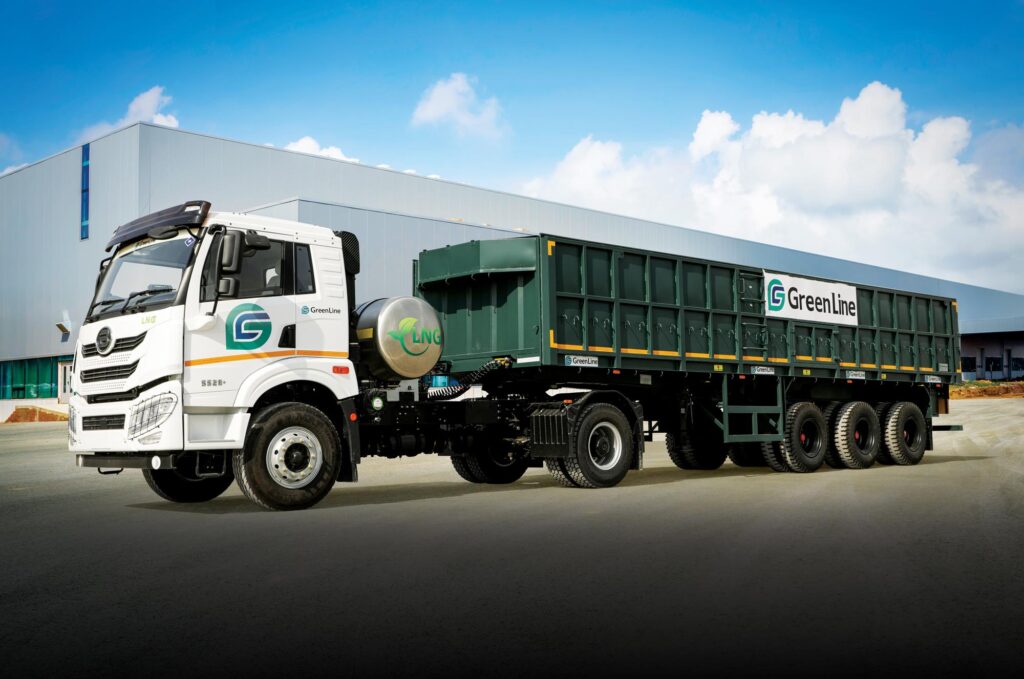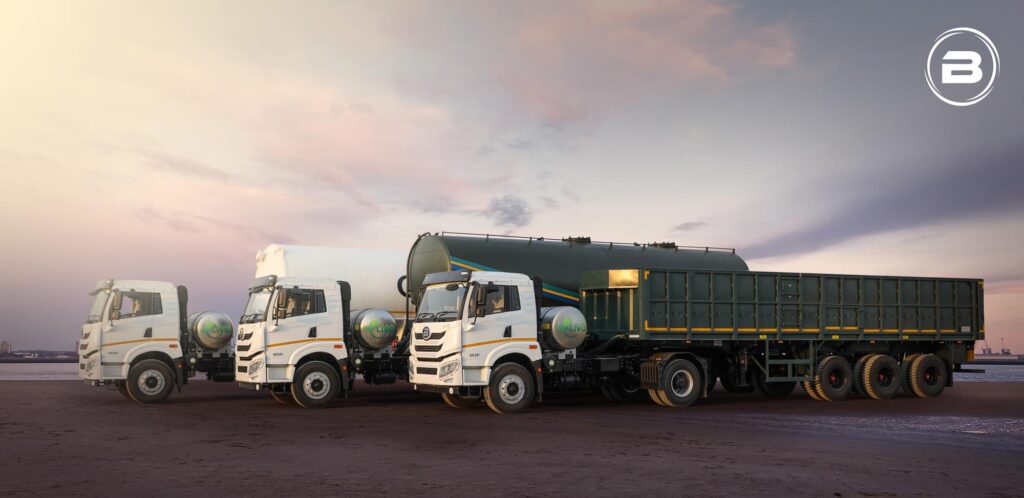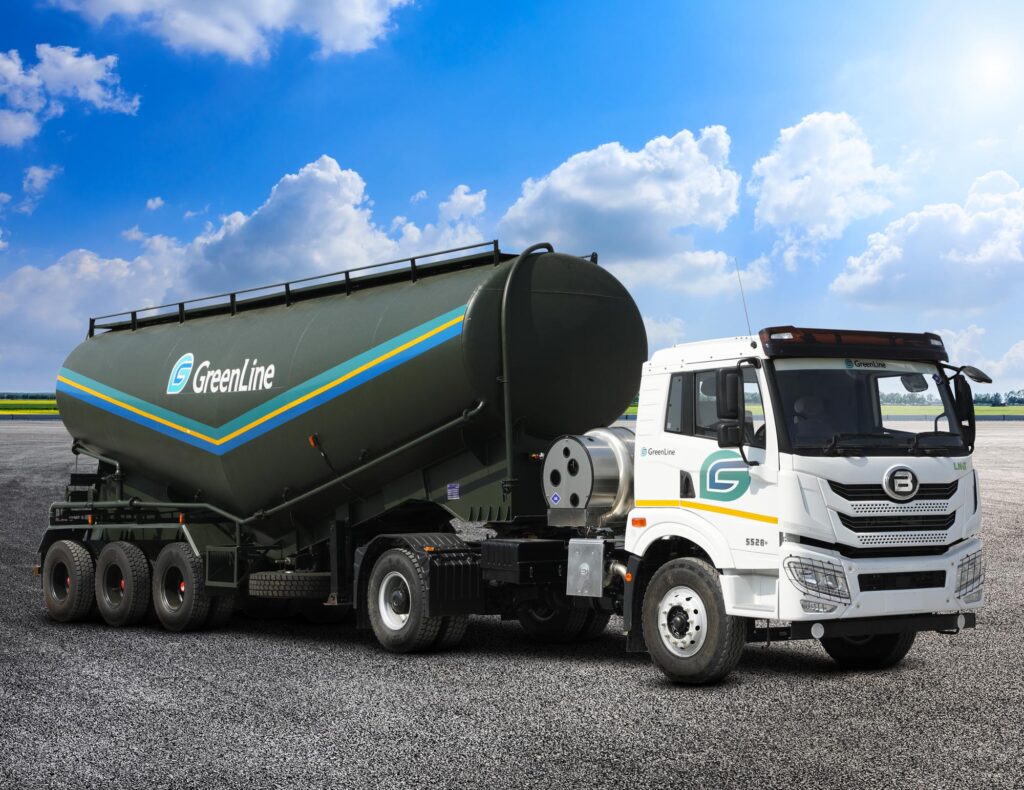
India’s ambitious environmental goals have ignited a vital discussion: is Liquified Natural Gas (LNG) the pivotal transition fuel? In an exclusive interaction with Anirudh Bhuwalka, CEO of Blue Energy Motors, Rajesh Rajgor explores the company’s pioneering efforts in bringing LNG trucks to India. Bhuwalka emphasizes collaborations with industry giants like the IVECO Group and stresses LNG’s significant effects on emissions, efficiency, and cost. Through proactive maintenance and strategic partnerships, Blue Energy Motors strives to spearhead India’s shift towards cleaner transportation energy solutions.
India is rapidly expanding its LNG fueling infrastructure, planning to establish 1,000 stations along major highways and industrial areas to promote cleaner transportation fuels, led by the Ministry of Petroleum and Natural Gas (MoPNG) and major oil companies like IOCL, BPCL, and HPCL. This initiative aims to support the transition from diesel to LNG for heavy-duty vehicles, particularly long-haul trucks, aligning with India’s strategy to enhance energy security and sustainability in its transportation sector.
India aims to reduce its carbon intensity by 45% by the end of the decade and achieve zero emissions by 2070. Bhuwalka highlights the pressing need to address pollution levels, stating, “India has around 4 million medium and heavy-duty vehicles, which contribute significantly to pollution. Although commercial vehicles constitute only about 4% of the vehicles on the road, they are responsible for 40% of automotive pollution. Within this 40%, heavy-duty vehicles account for 65% of the emissions. This underscores the urgency of tackling emissions from the transportation sector.”

Moreover, Bhuwalka stresses the urgency of decarbonizing the trucking industry, stating, “The numbers are staggering,” and warning that “With India’s economy poised for further growth, this pollution is set to double in the next decade.” He emphasizes the need for immediate action to prevent worsening air quality and congestion in cities. Turning to potential solutions, Bhuwalka highlights the merits of LNG as a transition fuel, asserting, “While LNG may not be as clean as electric or hydrogen options, it offers immediate benefits,” and citing their experience with LNG trucks showing “a 30% reduction in carbon footprint compared to diesel.”
This comparative analysis underscores the practicality and effectiveness of LNG as a viable alternative in the short to medium term. Additionally, Bhuwalka notes the affordability and accessibility of LNG technology, stating, “LNG technology is not only effective but also affordable,” and highlighting its appeal to a wide range of fleet operators, ensuring widespread adoption and impact in India’s transportation landscape.
Drawing from Blue Energy Motors’ extensive experience, Bhuwalka underscores the tangible impact of LNG technology, stating, “With over 1.5 crore kilometers logged, we have seen firsthand the transformative potential of LNG.” He asserts that LNG aligns with India’s push towards a gas-based economy and meets criteria of affordability and technological maturity, highlighting its viability and scalability in addressing transportation challenges.

Bhuwalka also notes the rapid expansion of LNG infrastructure across India, observing, “LNG fuel stations have proliferated across the country,” and emphasizing how this development enhances LNG’s accessibility and convenience as a fuel option for fleet operators nationwide. It is worth noting that MoPNG is spearheading several initiatives to accelerate LNG adoption, including 49 LNG retail stations, the establishment of 250 additional stations in South India, a pilot project for LNG supply in the Northeast, potential domestic gas allocation and swapping for LNG, retrofitting LPG trucks for LNG use, and the development of indigenous LNG dispensing units in Nashik to reduce equipment costs.

Leading the Charge with LNG Trucks
Blue Energy Motors entered the scene as a pioneer in the adoption of LNG technology. “We have been the first to launch LNG trucks, way back in September 2022,” Bhuwalka proudly states. This early adoption demonstrates the company’s commitment to innovation and sustainability, laying the foundation for their subsequent success in the field.
Their founding days coincided with India leap frogging from Bharat Standard (BS IV) Emission Norms to BSVI “Our inception coincided with a pivotal period in the industry, marked by heightened environmental consciousness.” Within a year, the company launched its first LNG truck, partnering with industry giants like JK Lakshmi Cement. “Our impact was profound,” notes Bhuwalka, with 500 LNG trucks deployed across diverse sectors by March 2024. Looking forward, Bhuwalka affirms, “We’re committed to leading the transition to greener transportation solutions.”
Bhuwalka’s strategic vision encompasses a holistic approach to product development, with an emphasis on technological innovation and eco-friendly alternatives. “Our goal at Blue Energy is to pioneer the transition to clean energy in the trucking sector,” affirms Bhuwalka. “We believe that by leveraging cutting-edge technologies, we can revolutionize the way trucks operate while minimizing their environmental impact.”
Bhuwalka highlights Blue Energy Motors’ strategic partnership with the IVECO Group and their engine company FPT as crucial for making LNG trucks feasible for fleet operators. “We were pioneers in developing cooperation to launch trucks in India, addressing unique power-to-weight ratio requirements,” he notes, emphasizing that “building ground zero products with new technology into a new market has its challenges, but our partnership with IVECO Group facilitated a swift entry into the market.” He adds, “Through strategic partnerships and relentless innovation and localization, we aim to address the evolving needs of fleet operators and pave the way for widespread adoption of clean energy solutions.”
Triple Benefit for Customers, Drivers, and Fleet Operators
Bhuwalka, identifies three key stakeholders in the transportation value chain: end customers, drivers, and fleet operators, whom the LNG adoption impacts. For customers, LNG addresses pollution without increasing logistics costs. “LNG addresses the core issue of pollution, specifically Scope Three emissions, without inflating logistics costs,” he asserts, noting the enthusiastic response from industry leaders like Fortune 500 companies for its sustainability and cost-effectiveness.
For drivers, LNG trucks offer a quieter and cleaner work environment. “LNG trucks are 30% quieter than their diesel counterparts,” he emphasizes. For fleet operators, despite a slightly higher upfront cost, LNG trucks have lower total operating costs, boosting profitability. “While the upfront capital cost may be marginally higher, the total operating cost of LNG trucks significantly undercuts that of diesel,” he clarifies.
Balancing these benefits, Bhuwalka acknowledges the lack of government incentives for LNG adoption. “Unfortunately, there are no incremental incentives for LNG trucks, as of yet” he notes. “While EVs enjoy a 5% GST rate, LNG trucks still face a 28% tax, hindering their wider adoption.” Infrastructure development, however, is progressing. “With 12 LNG stations operational and over 25 more in various stages of construction, the infrastructure is rapidly evolving to meet demand,” he reveals. It is evident that LNG offers significant financial and environmental benefits, making it a compelling choice for fleet operators seeking sustainability and cost-efficiency.
Looking ahead, Bhuwalka expresses optimism about the future of LNG, stating, “As LNG prices stabilize and political uncertainties subside, the value proposition of LNG trucks will only strengthen, making them an attractive investment for the transportation industry.” He elaborates on the broader market dynamics, adding, “The increasing availability of LNG and its stable pricing further enhance the appeal of LNG trucks, positioning them as a sustainable and cost-effective solution for the transportation sector.”
Proactive Maintenance & Support
Delving into the logistical aspects of the company’s operations and addressing service and maintenance, Bhuwalka details, “Our workshops are strategically positioned near LNG stations, ensuring timely service and support for our customers. Additionally, our use of cutting-edge technology enables us to proactively manage maintenance, providing peace of mind to fleet operators.”
Reflecting on the maturation of LNG truck operations, Bhuwalka highlights the company’s proactive approach to service and maintenance. “The learning curve of supporting these trucks has been relatively new,” he explains. “Our use of technology, capturing real-time data and insights, allows us to proactively manage maintenance and provide superior service and support.”
Furthermore, Bhuwalka emphasizes the company’s commitment to quality service, stating, “All our workshops are owned by us, strategically located near LNG stations to ensure comprehensive support for our customers in the top-notch quality that we adhere to.” He adds: “As we enter our second year, we anticipate exponential growth in demand and volume ramp-up,” he predicts. “With a full order book and increasing market maturity, the LNG industry is poised for significant expansion in the coming years.”
Accelerating Clean Energy: EVs & Hydrogen Fuel Cells
Looking forward, Anirudh Bhuwalka outlines Blue Energy’s expansion into electric vehicles (EVs) and hydrogen fuel cell technology, aiming for a diversified product range beyond LNG trucks. Despite challenges like upfront costs and infrastructure limitations, Bhuwalka expresses optimism about the long-term viability of electric-powered trucks. “We are committed to developing EVs that deliver superior performance and efficiency,” he affirms, underscoring investment in research, development, and strategic partnerships to drive the transition.
Moreover, Bhuwalka emphasizes the importance of government incentives in promoting clean energy adoption. By aligning with national agendas for sustainable development, Blue Energy seeks to capitalize on emerging opportunities in the clean energy market. “As governments prioritize environmental sustainability,” Bhuwalka notes, “we see tremendous potential for growth and innovation.”
Blue Energy Motors stands poised at the forefront of this transformative era in trucking, with a steadfast commitment to clean energy and sustainable innovation. With Bhuwalka’s visionary leadership, the company aims to lead the charge towards a greener future for the trucking industry in India.